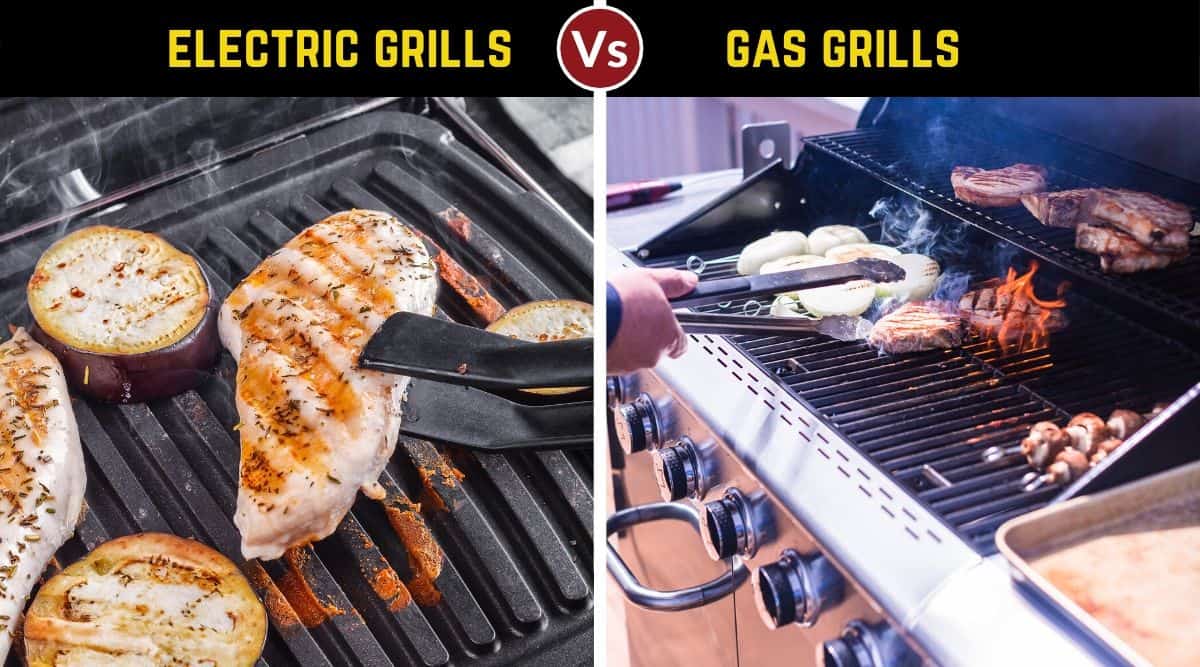
Head-to-head. Toe-to-toe. Mano-a-mano. Before your very eyes, two contenders are going to slug it out for grilling supremacy. Or, at least we’re going to compare and contrast two popular types of grill to help you decide what’s best for you.
Less dramatic? Maybe. More useful? No doubt! The two grill types in this battle? Electric vs Gas grills.
Before deciding to buy a grill, it’s important to know what kind is best suited to you and your needs.
In this article, we’re going to take a look at the pros and cons of owning either an electric or gas grill, to help you decide which is right for your yard, patio, balcony, trailer, tailgate, or wherever you plan on grilling.
Note: We have 3 further articles comparing grills of different fuel types that we’d like you to also check out: Pellet Grill vs Charcoal Grill, Pellet Grill Vs Gas Grill, and Charcoal vs Gas Grill.
Let the games begin!
Jump to:
- 1 Electric Grill General Overview
- 2 Gas Grill General Overview
- 3 Gas vs Electric Grill: Comparison Table
- 4 Electric Grill Vs. Gas Grill Contrasts and Comparisons
- 4.1 Quality and Consistency of Finished Foods
- 4.2 Ease of Use and Convenience
- 4.3 Versatility
- 4.4 Temperature Range — High Heat and Low Heat
- 4.5 Size, Footprint and Space Required
- 4.6 Cooking Capacity
- 4.7 Reliability
- 4.8 Bad Weather Effects
- 4.9 Maintenance Required
- 4.10 Initial Cost to Buy
- 4.11 Ongoing Cost To Run
- 4.12 Popularity and Community
- 5 Electric Grill Summary — and Who Should Buy One?
- 6 Gas Grill Summary — and Who Should Buy One?
- 7 One Grill Leaves…
Electric Grill General Overview
Differing from all other grill types, electric grills do not use any form of combustion to cook food. Cooking on one is rather like using an electric griddle indoors.
Just plug into a convenient outlet and instead of fire heating the cooking surface and the space around the food, electricity does the job. So, in a sense, it’s maybe not so different after all.
You’ll still get grill marks from the raised ridges on the surface. What you won’t get is flare-ups singeing your food. They are very simple to use and will provide consistent results right from the start.
Gas Grill General Overview
Fueled by either propane or natural gas, they use a burner — or multiple burners — to cook food over an open flame. Food rests on a grate above the flame, and the cook adjusts the intensity of the fire up and down to control the temperature.
The best gas grills offer a real flame-cooked experience without the mess of charcoal. Instead, you just have to ensure you’ve got a steady supply of gas.
This means either buying propane tanks, typically 20-pounders, or connecting to a natural gas line for an uninterrupted flow of fuel.
Gas vs Electric Grill: Comparison Table
Here’s a quick look at how these two types of grill stack up before we go in-depth.
| Category: | Electric Grill | Gas Grill |
|---|---|---|
| Quality of finished food | Even cooking; grilled appearance; little to no smoke flavor | Possibly uneven cooking depending on experience, conditions; some smoke and char flavor possible |
| Ease of Use | Very easy-to-use; little to no learning curve | Not hard to use, but not as easy as electric |
| Versatility | Zero versatility; grilling only | Far more options for anyone interested in trying new ways of grilling |
| Temp Range | Approximately 250 °F – 500 °F | Approximately 250 °F – 500 °F |
| Size and Space Required | Minimal space needed; as little as 2’ × 2’ in many cases | Highly variable; anywhere from about 3’ × 3’ to over 8’ × 4’ |
| Cooking Capacity | Very small; rarely over 250 Sq. In. | Anything from <250 Sq. In. to >600 Sq. In. Of primary cook space |
| Reliability | Reliable, but may be costly to repair | Reliable; repairs likely to be cheaper on average |
| Weather Considerations | Cannot be used outdoors in rain or snow; might be operable indoors | Can be used in any kind of weather |
| Maintenance Needs | Minimal requirements; easy to clean | Requires more cleaning, inspection, etc. |
| Relative Cost to Buy | Lower average entry point | Wider range of prices, but averages more expensive for decent quality |
| Relative Running Costs | Inexpensive; about $0.25/hr. Or less, depending on local electricity rates | Natural gas about $0.15/hr.; propane around $0.60/hr. |
| Popularity | Outdoor electric grilling is much lower in popularity | Very popular, with a large online community |
Electric Grill Vs. Gas Grill Contrasts and Comparisons
It’s time for a deeper dive into some key aspects to consider when choosing the right kind of grill for you.
Quality and Consistency of Finished Foods
Because it is easy to hold at a particular temperature, and there are few to no flare-ups, cooking is very consistent with an electric grill. You can cook any kind of food, too, without trouble. For example, a solid, non-stick cooking surface is perfect for fish, negating the need for a grilling cage to protect the delicate meat.
Once you’ve got the hang of it, a gas grill provides consistent results, too. They require more work, however, since heat will fluctuate, and grease drippings can cause flare-ups.
For quality, though, there’s really no comparison if you enjoy the taste of barbecue. A gas grill uses real, open flames to heat the grate, air, and food. Dripping juices will create some smoke (not as much as charcoal, but some), and charred fat, rubs, and sauces will greatly enhance the flavor.
Unfortunately, an electric model offers little to none of this type of goodness.
For really delicious barbecue that tastes like barbecue, a gasser beats an electric every time.
Ease of Use and Convenience
Electric grills are extremely easy-to-use, and you can set one up anywhere there’s a power supply. Anyone who’s ever used an electric stovetop or a griddle will have no trouble operating one of these handy bits of equipment.
Adjusting the temperature is fast, simple, and precise, done with just the turning up and down of a dial.
Gas grills light up virtually instantly with a built-in ignition system (or with a match, in a pinch).
As with electric, you can adjust the temperature with just a few turns of a knob. However, you won’t have the same level of precision, and it may take some time to learn the right settings for different types of cooking like searing and roasting.
While both offer increased ease of use and convenience versus charcoal grilling, between the two, electric grills win the simplicity competition over gas.
Versatility
If you feel like getting creative with your grilling, you’re going to find your electric grill very limiting. Yes, they can put a good sear on food with their high-heat capabilities, and they’ll cook your food to the doneness you like. But, that’s it.
A gas grill, however, offers far more options, especially if you have 2 or more burners at your disposal. Those keen to get the most out of their grill will soon learn about 2-zone cooking, where you sear in the hot zone and finish in the cooler zone.
You can also set up for roasting, or add a smoke box for some smoking under the lid.
For anything beyond the most basic grilling, gas is the way.
Temperature Range — High Heat and Low Heat
Having a wide temperature range opens up more grilling possibilities. A typical electric grill has a low setting of about 250 °F (121C). This is great for reheating food or cooking delicate items like fish, fruit, and vegetables. You’ll be able to hold it, too, because of the internal thermostat.
High-end temperatures on an electric grill can really vary. Some very good models can hit 600 °F (316 °C) or higher, which is awesome for searing. On average, though, expect to top out closer to 500 °F (260 °C), which is still plenty good enough for searing.
A gas grill will have a similar low-end, but it may be harder to keep it there because the flames just keep coming. You’ll need to set up 2-zone cooking for good low-temperature cooking. As for the top end, expect to hit max mercury between 500 °F – 550 °F (260 °C – 288 °C). If you want the highest highs, look for a gas powered infrared burner for temperatures way beyond 700 °F (371 °C), even up past 900 °F (480 °C) and higher!
We’re going to give the edge to electrics for consistent lows, but to gassers for the potential they have for major highs, so we’ll call this round a draw.
Size, Footprint and Space Required
In this category, we’re really not comparing apples to apples. Electric grills all lean towards the small size, with the very largest approaching the very smallest gas grills in size. You may require as little as 2 square feet for one, perhaps a little more to include a stand with wheels and side shelves.
Gas grills, however, can be anything from minuscule to monstrous. The smallest will need only a few feet to each side. An average-size 3-4 burner grill might need a space more like 6’ x 4’. Or, you can go with an outdoor kitchen-style unit that’s 8 feet or more in length including side burners and workstations.
Cooking Capacity
The biggest electric grills are still pretty small as grills go. Don’t expect to find more than, say, 240 square inch cooking surface. That’s ok for a couple, a very small family, or maybe a few buds tailgating or camping. But don’t expect to host a neighborhood backyard BBQ bonanza with an electric.
Gas grills, on the other hand, come in a range of sizes from very small to very, very big. You can get compact units, or those good for a small family, same as with electric. But, if you need over 600 square inches of cooking space (think 20 burgers at the same time), then gas is your grill.
Reliability
This category pretty much comes down to “you get what you pay for.”
There are some highly reputable companies making electric grills including George Foreman, Weber, and Cuisinart. We don’t expect to see many problems with names like these.
The same goes for gas grills. Go with a good name, and you’ll minimize the chances of something going wrong with yours.
If something does go wrong (and that is always a possibility, no matter what you buy), though, it will be much cheaper and easier to repair your gas grill.
Parts are easy to get at and can generally be replaced by the owner. Electric grills are not so easily serviced, especially if there’s a malfunction with a thermostat or anything electronic.
Bad Weather Effects
Well, this is an interesting one.
Quite frankly, you can’t use an electric grill outdoors in any kind of bad weather. Precipitation and electrification are not meant to be together, and electronic components aren’t built for extreme cold, either.
What you can do, however, is take your electric grill into the garage or possibly even into the kitchen, because many models can be used indoors as they do not release any noxious fumes and create a minimum of smoke.
Gas grills can be used in any weather you care to endure. While they may have more trouble heating up when the temperature drops outside, year-round grilling is possible in all but the most arctic of climates. Same goes for rain and snow — if you can put up with it, so can your grill.
Just remember to wipe off any moisture before covering it again to prevent rusting.
Hard to say if either one is the winner here, but overall, we kinda prefer the idea of bringing the party indoors when the weather sours anyway.
Maintenance Required
Taking care of an electric grill is a piece of cake; keep it dry and wipe down the cooking surfaces. Many have non-stick coatings to make debris removal a snap, and you may even be able to remove the grate or cooktop entirely.
A gas grill, while not hard to take care of, does require more attention. You’ll need to burn off and scrape off food residue, wipe away moisture, check gas connections, ensure burners are secure and intact, watch for rust, and even spider webs in the tubes (seriously).
It sounds like a lot, but it’s not that big a deal — it’s just more than you’ll deal with on an electric grill.
Initial Cost to Buy
There are some good electric grills available at really low prices, some for less than $100. Even some of the best on the market will set you back no more than a decent gas grill. There are some super high-end, commercial-grade models that run up to $1000, but very few of us need that kind of gear.
The low-end for gas grills is a bit higher than for electrics, but there is a lot more choice. You can, of course, spend many thousands of dollars on a gasser if you’re so inclined — but most of us aren’t.
Giving the edge to electrics for start-up cost, but we’re not going to call this a deal-breaker.
Ongoing Cost To Run
How much it costs to run your electric grill will vary depending on how much you pay for electricity. For example, if you’re running on solar panels, it will cost you absolutely nothing. Pretty sweet!
Now, for those of us ON the grid, we’ll have to pay to plug. If you’re running an average grill and paying 15 cents per kWh (kilowatt-hour), it will cost you about $0.25/hr. While cooking. Not so bad.
Depending on how far the pipe has to run, a natural gas hook-up can be anywhere from moderately to very expensive to install. Once it’s in, though, the fuel doesn’t cost a lot. Expect to pay about $0.15/hr.
Propane is the most expensive option of the three. The actual figures will depend on your BTUs, but about $0.60/hr. Is a reasonable estimate.
None of these are large sums of money, but natural gas is the most economical if you ignore the installation cost.
Popularity and Community
If you buy an electric grill, you’ve joined an elite club — if you exclude the more than 100 million people who own indoor George Foreman grills!
Electric grills are certainly on the rise thanks to their convenience and the way they fit into a modern lifestyle; no yard? No problem! Still, there isn’t nearly the community or resources to support your journey. But, given how easy they are to use, maybe that doesn’t matter?
Gas grills, however, are very popular. They come in every shape and size and are great for everyone from singles to large families. There are many social media groups and websites you can turn to for support, encouragement, and advice.
Electric Grill Summary — and Who Should Buy One?
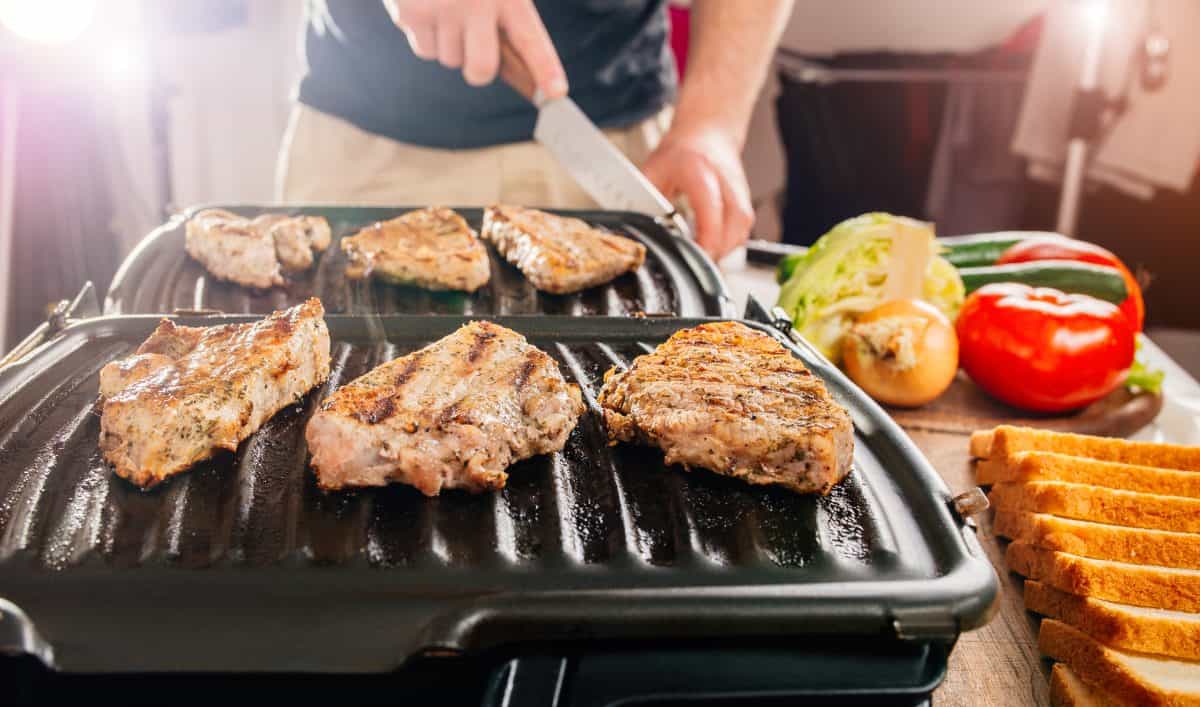
Charged up about electric grilling? Consult this checklist and see if it’s for you.
What We Like
- Never runs out of fuel
- Easy to operate and clean
- Possible to use indoors
- Inexpensive to run
What We Don’t Like
- Can’t cook without electricity
- Can’t create real charred or smoky flavor
- Hard to find one with a large cooking area
- 2-zone grilling and roasting not possible
Who are They Best Suited to?
- Casual/occasional grillers
- People with restrictions on grilling (apartments, condos, town homes)
- People who don’t like the taste of smoke or char
You May Prefer Gas if…
- You prefer a smoky flavor
- You want to have more options, like roasting
- You like to grill for a crowd
Gas Grill Summary — and Who Should Buy One?
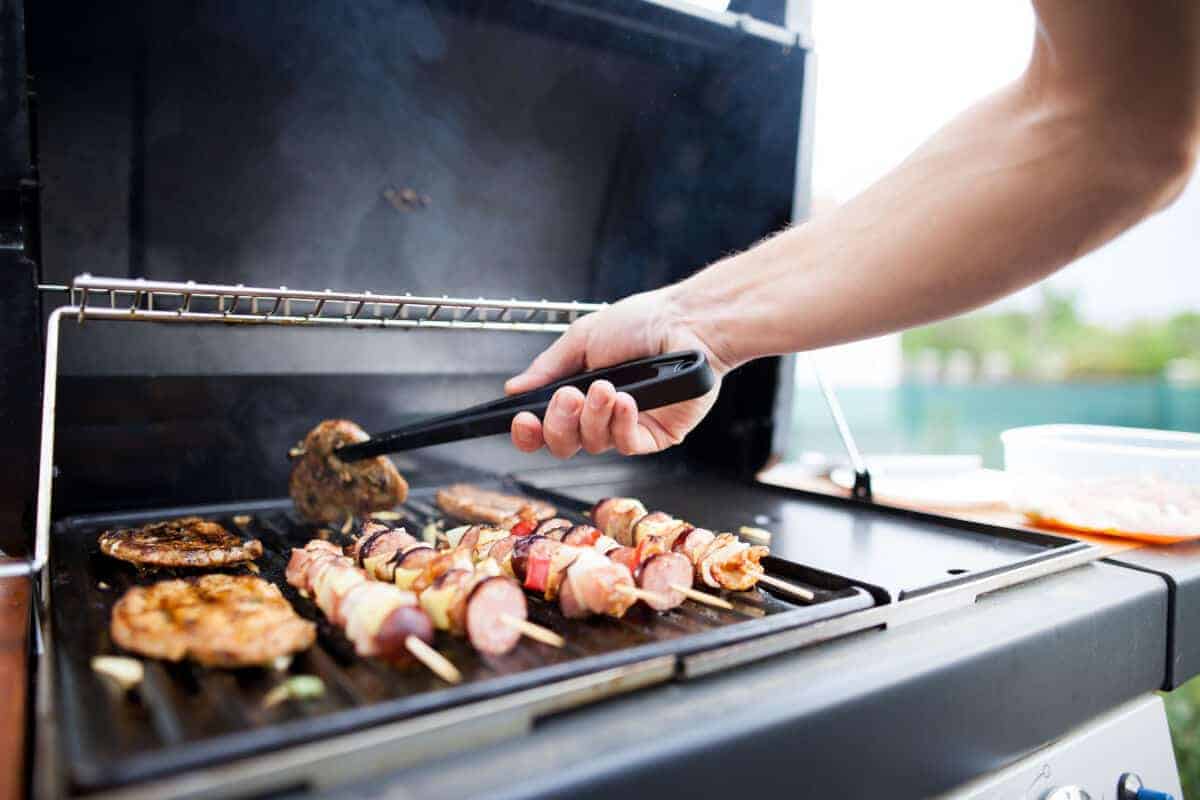
Ready to hit the gas? Here are some points to ponder, first.
What We Like
- Can’t cook without electricity
- Can’t create real charred or smoky flavor
- Hard to find one with a large cooking area
- 2-zone grilling and roasting not possible
What Could be Improved
- Propane runs out and has to be replaced
- Natural gas is expensive to connect
- More maintenance required
- Typically not as portable as electric grills
Who are They Best Suited to?
- People with a pre-existing gas connection
- Anyone who enjoys real barbecue flavor
- Large families or groups
You May Prefer Electric if…
- You aren’t allowed to cook with gas where you live
- You prefer a “cleaner” taste to your food
- You like to cook indoors sometimes
One Grill Leaves…
And that wraps up our look at electric versus gas grills. Who’s left standing?
Both types offer a unique grilling experience, but, given a choice, we’d take gas every time.
The quality of the food, which we consider the most important factor, is far, far better off a gas grill. If you’re on the fence, and you’ve got the space to use one safely, we recommend a gas grill over an electric.
Mind you if gas isn’t an option, or you really just want the opportunity to cook worry-free in the great outdoors, an electric grill can be a rewarding investment. For some, this may be the better or even only choice. Between electric grilling and (gulp!) no grilling at all, obviously, we’ll choose electric!
Now that you know what kind of grill is best for you, we extend an invitation to explore the rest of the site. We’ve got answers to the grilling questions you never knew you had. And, if you don’t see an answer, contact us via email, social, or our online form, and we’ll get it for you.
Thanks for reading — now go get your grill on!


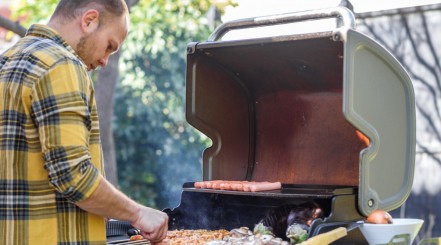
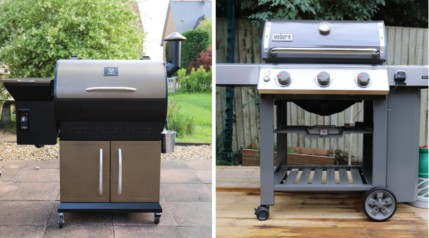
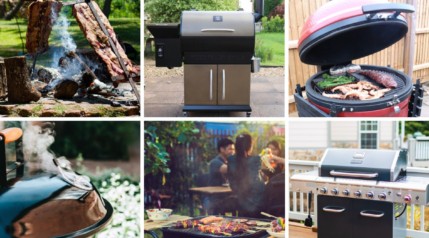

What if no electric? Power is off. Can I still use my (not propane) gas grill? ? Sure can’t use an electric grill, indoors or out.
If non-propane and not rigged up to the electric, then yes. If non-propane but rigged up to the electric, you probably need to manually light it is all.
I wish you had mentioned some of the health and especially larger impacts of gas grills. Red meat flames = carcinogenic, this is well established scientifically. Of course, most people decide it’s worth the risk anyway, or they can’t help themselves. But maybe more important is the fire risk. Living in the mountain west, it’s becoming too hard to ignore. I am afraid too many guests who use our mountain cabin won’t understand how the wind is blowing or will look away with a beer… it is telling that so many insurance companies have pages and pages on grill safety. I feel like gas (and charcoal) grilling is something our kids will look back on and shake their heads over.
Hi, Mark.
I cover the potentially carcinogenic effects of grilling in this article here: Does BBQ, Grilling and Smoking Meat Cause Cancer? We will be posting an article on grilling safety in the coming weeks.
Can a brand new gas grill that’s hooked up to gas line from house be converted to electric grill for safety reasons. It was installed too close to house and has a roof overhang.
Hi Pat. I don’t know of any way to convert a gas grill to an electric grill I’m afraid. They have completely different internal components.